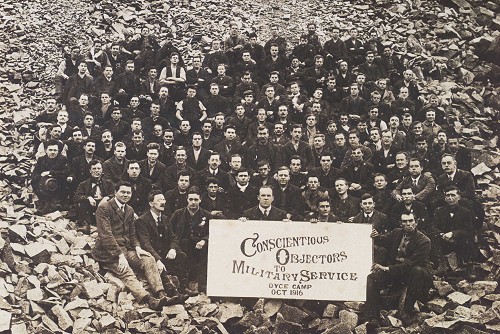"Despite initial doubts, the volunteer principle worked: by the end of 1915, the British total was 2 466 719 men, more than would be achieved after the introduction of conscription in May 1916 and just under half the wartime total of 5.7 million men who served in the army during the war years. of their number 320 589 or 13% of those who volunteered in 1914 - 1915, were Scots."
The Scots contribution to the surge of volunteers has been noted on another page of this blog. However, there were others who did not and would not volunteer. Some refused to volunteer because they were opposed to the war for religious or political reasons. Others were opposed to conscription which was introduced in 1916 as the surge of volunteers slowed and the casualties mounted on the western front.
Pacifist Opposition to the War
1. Religious pacifists
Religious groups such as the Society of Friends (more commonly known as "Quakers") had always opposed war for religious and moral reasons. They took the Bible as the word of God. The Commandment says "Thou shallt not kill" and Jesus told his followers to "turn the other cheek" if they were struck by an enemy. Quakers and other groups such as the Jehova's Witnesses and Plymouth Brethren and many other Christians refused to fight.
The Cadburys, Rowntrees and Terrys, all famous chocolate making families were Quakers and supported many anti war groups financially.
2. Other Pacifist Opposition
The most important pacifist organisation was the No Conscription Fellowship. This organisation encouraged men to refuse war service. The NCF required its members to "refuse from conscientious motives to bear arms because they consider human life to be sacred."
Political opposition to the war
1. The Union of Democratic Control
The most important organisation to oppose the war was the Union of Democratic Control. Find out more and make notes from this site.
2. Socialist Opposition to the War
Attitudes to the war were not based on party loyalty. The UDC was formed when Liberal government minsters resigned rather than support the war. This was the first of many splits in the Liberal Party. You will find out in another Higher unit that these splts were to be fatal to the Liberals.
The other major party to be split over the war was the Labour Party. Some Labour politicians supported the war but others strongly opposed it. Among these were Ramsay Macdonald and Kier Hardie. They were Scots born but their political work was mainly in England. Among Scots based socialists who opposed the war were James Maxton, Mary Barbour and Helen Crawfurd of the ILP and John Maclean of the Scottish Socialist Party.
Source: John Maclean on 17th September 1914.
"... it is our business as Socialists to develop a “class patriotism,” refusing to murder one another for a sordid world capitalism. The absurdity of the present situation is surely apparent when we see British Socialists going out to murder German Socialists ... Let the propertied class go out, old and young alike, and defend their blessed property. When they have been disposed of, we of the working class will have something to defend, and we shall do it."
3. The Introduction of Conscription
Until 1916, recruits joined the army as volunteers. In May 1916, conscription was introduced: able bodied menwere to be forced to join the army. There were only four exceptions ...
a. Those who were needed for essential war work could be exempted if they had the support of their employer.
b. Compassionate grounds. For example if an aged mother or father relied on the person for support.
c. If Ill health or infirmity made the person unfit for service.
d. Conscientious grounds. (Those who applied for exemption wee known as conscientious objectors or "conchies".)
Local tribunals were set up to hear appeals and grant exemptions. This led to much unfairness since an appeal might be granted by one local tribunal but a very similar case turned down by another local tribunal. The tribunals often dealt harshly with those who appealed for political or conscientious reasons.
Source: from the Spartacus.schoolnet website.
"About 16,000 men refused to fight and these were called conscientious objectors. Most of these men were pacifists, who believed that even during wartime it was wrong to kill another human being. About 7,000 pacifists agreed to perform non-combat service. This usually involved working as stretcher-bearers in the front-line, an occupation that had a very high casualty-rate. Over 1,500 men refused all compulsory service. These men were called absolutists and were usually drafted into military units and if they refused to obey the order of an officer, they were court-martialled.
Forty-one absolutists were transferred to France. These men were considered to be on active service and could now be sentenced to death for refusing orders. Others were sentenced to Field Punishment Number One. Those found guilty before being transferred to France were sent to prisons such as Peterhead or Dartmoor to undertake hard labour. Conditions were made very hard for the conscientious objectors and during the war sixty-nine of them died in prison."

Conscientious objectors held at Peterhead prison worked at the nearby Dyce quarry. Conscientious objectors were also used as labour at the Broxburn Bone Meal works near Roman Camp.